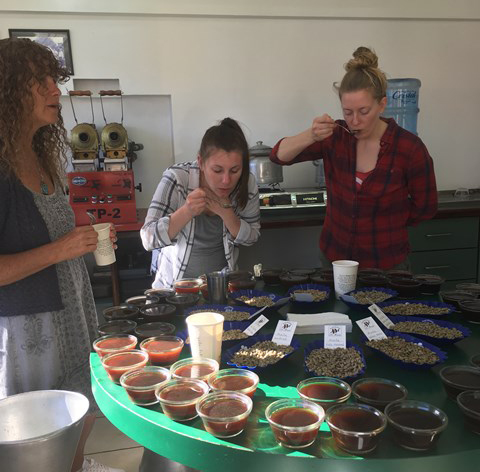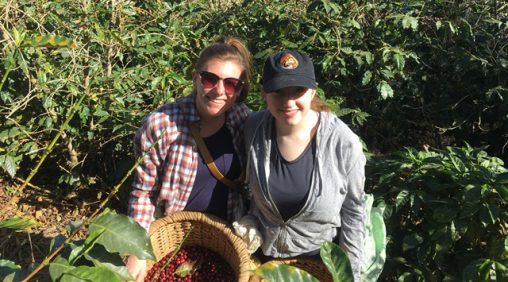
Wright State students Jordan Collins and Jessica Brown toured coffee farms and the Boston Stoker office in Costa Rica as part of the Raj Soin College of Business’ partnership with the coffee company.
She usually takes her coffee with cream and a little sugar.
But a three-day tour of coffee farms in Costa Rica as part of the Wright State Raj Soin College of Business’ partnership with the Boston Stoker company may have converted Jordan Collins to drinking it black.
“I have a much greater appreciation for a black cup of coffee now,” said Collins, a senior in mass communication with a minor in marketing. “Every morning at breakfast I would have black coffee, and it was the best coffee that I ever had. It is sweet enough that you don’t need the added stuff.”
Collins, of Springboro, is chief marketing officer for the ReyRey Café and a member of the café’s Student Management Board.
Sponsored by the Reynolds and Reynolds Foundation, the student-operated café opened in 2015 and is housed in Rike Hall, home of the business college. The café is run by the four students on the board and employs a half a dozen student baristas. Profits go toward student scholarships.
“For the student, the biggest benefit is real-life business experience,” said Collins, adding that the students gain skills in operating a business, creating efficiencies and customer service.
Boston Stoker partners with the ReyRey Café to be the exclusive coffee brand served. The café recently expanded its drink options and features a different type of coffee every day.
Boston Stoker has also established a fund with the Wright State University Foundation to enable Wright State business students managing the cafe to travel internationally to learn the coffee industry business at coffee farms in Costa Rica and other coffee-producing countries.
“Boston Stoker sees it as another learning experience, an opportunity for students,” said Collins.
This year, Collins and human resource management major Jessica Brown, were selected to go on the Costa Rica trip with Boston Stoker representatives. Brown will be chief executive officer of the ReyRey Café student board next academic year.
The two students flew to the Costa Rican capital of San Jose on Feb. 11 and over the next few days toured several coffee farms.
Costa Rica is a rugged, rain-forested Central American country bordered by Nicaragua, Panama and Ecuador. Coffee was first planted in Costa Rica in 1808, and by the 1820s it surpassed tobacco, sugar and cacao as a primary export. Coffee production remained Costa Rica’s principal source of wealth well into the 20th century.
The students first toured Hacienda La Minita, where they observed the farm’s coffee-harvesting processes and even helped pick coffee cherries off of the bushes. Collins acknowledged it was hard work.
“The workers scale mountains trying to get to these different coffee plants,” she said. “Coffee grows better at higher elevations so it’s all up on these mountains.”
The cherries are taken to the farm’s mill, where they are cleaned and the pulp removed to reveal the beans, which are then purchased and roasted by Boston Stoker.
“You realize how important it is for all of these different processes to go perfectly. Otherwise, it changes every flavor of the coffee,” said Collins. “It takes a lot to get one cup of coffee. It was fascinating.”
The students also toured several other family coffee farms as well as an organic farm, where the beans are processed by hand.
“I gained an appreciation of the whole process of getting coffee ready,” said Collins.” And I got a greater appreciation for local growers, growing it more naturally. It’s not mass-produced.”
The trip culminated at the Boston Stoker offices in San Jose, where the students tasted about 20 different coffees, including ones from Brazil, Argentina, Colombia and Chile.
For Collins and Brown, the trip was an eye-opening education on coffee.


 Wright State to expand nursing facilities to meet workforce needs and prepare more graduates for in-demand careers
Wright State to expand nursing facilities to meet workforce needs and prepare more graduates for in-demand careers  Wright State student-athletes make a lasting impact on local family with more to come
Wright State student-athletes make a lasting impact on local family with more to come  Wright State names Rajneesh Suri dean of Raj Soin College of Business
Wright State names Rajneesh Suri dean of Raj Soin College of Business  ‘Only in New York,’ born at Wright State
‘Only in New York,’ born at Wright State  Wright State president, Horizon League leaders welcome new commissioner
Wright State president, Horizon League leaders welcome new commissioner 